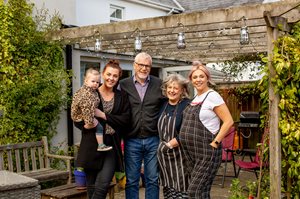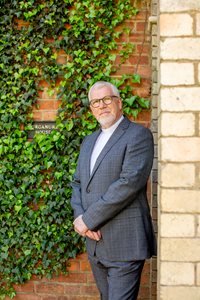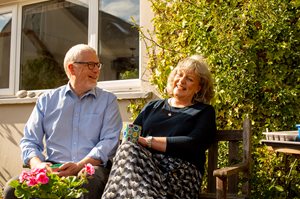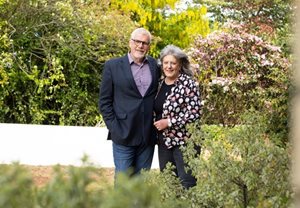David Bruce is not an easy man to interview.
I have been interviewing people for 30 years. But with David, I found myself chatting. He listens well. His answers provoke conversation. He makes you think.
When David and I first spoke, the reality of what Coronavirus meant to all of us was still to bite. Yet our conversations in the weeks and months following, give an insight into the man chosen to lead Irish Presbyterians on through the continuing Covid-19 pandemic, in an increasingly secular society, with Brexit, and who knows what else, waiting in the wings.
 David Bruce worships at Elmwood Presbyterian in Lisburn with his wife Zoë. Born in 1957, the father and grandfather (four adult children and one granddaughter) grew up in Banbridge, but was educated in Belfast at Campbell College and Queens University. He went on to study theology in Aberdeen, and then for the PCI ministry at Union Theological College in Belfast.
David Bruce worships at Elmwood Presbyterian in Lisburn with his wife Zoë. Born in 1957, the father and grandfather (four adult children and one granddaughter) grew up in Banbridge, but was educated in Belfast at Campbell College and Queens University. He went on to study theology in Aberdeen, and then for the PCI ministry at Union Theological College in Belfast.
He comes to the Moderatorship with no congregation, no charge, although he has previously served as assistant in Wellington Street, Ballymena, and as minister of Clontarf, Ormond Quay and Scots Presbyterian Churches in Dublin.
I first met him as a student when he served as a Travelling Secretary for the University and Colleges Christian Fellowship, now known as Christian Unions Ireland. He later worked with Scripture Union in Ireland and former Soviet republics. He currently serves as Secretary to the Presbyterian Church in Ireland’s Council for Mission in Ireland.
Covid-19
I ask David about the virus, which has swept the world, bringing about a prolonged period when Christians in the UK and Ireland cannot meet in church, because of government restrictions. He points out that in the world church, restrictions on public worship are normal – even if the reasons are usually different.
He explains; “In Tajikistan where I preached in a local indigenous church, they meet in secret because it is illegal to do so publicly, and indeed they live in constant fear of physical attack. In the uplands of Armenia, I preached to a group of new believers who had never met in worship as a church before. The idea was completely new to them.”
He points out that we have been used to comfortable meeting houses, freedom to gather, and the weekly expectation of being welcomed into a safe place. “We may even mistakenly imagine this is our right. The call to worship together is a biblical command. The freedom to worship together is a privilege, which may be withdrawn from us at any time.”
So how do Presbyterians view the Covid-19 virus? A challenge? A divine lesson? A judgement? “God acts in history” replies David carefully. “Let’s be careful to acknowledge that, and to look for signs of His activity in the darkest moments. Sin has desperately polluted the universe – and this virus is one more indicator that the world is ‘out of kilter’ with God’s design. By our loving, caring and selfless actions, we can help mitigate the worst effects of this tragedy, and be the hands and feet of Christ where he has placed us.”
We talk about the inn ovative ways churches have used technology to keep in touch, but as David points out, there is no substitute for holding someone’s hand, and praying with them through a crisis, the very thing we are prevented from doing.
ovative ways churches have used technology to keep in touch, but as David points out, there is no substitute for holding someone’s hand, and praying with them through a crisis, the very thing we are prevented from doing.
“These restrictions are so painful to the Church,” he explains, “because they are a denial of the incarnation which pushes us to enter each other’s suffering. We have been un-pastored by this virus. We long that we can reclaim this spiritual calling.”
When David was nominated in February, becoming Moderator-Designate, he prayed that God would point us to the things that matter most to Him. He believes that Brexit and the shape of our political relationships on this island are very important, but in the face of this pandemic, other concerns might have to wait.
He goes on; “We can expect that the Presbyterian Church in Ireland will be different in some ways when this is over. We should seek this, and welcome it.”
Presbyterianism in Ireland
David’s current job with the Council for Mission in Ireland gives him a particularly good overview of Presbyterianism here. “I have always been concerned to communicate the deep-seated reality of faith to those who don’t have it,” he says. “That’s always been part of my spiritual DNA since the start, and remains so today.”
As we talk, it is clear that David is acutely aware of just how much the island of Ireland is changing, and not just because of Covid 19, Brexit or growing secularism. What is the future for our congregations?
The Presbyterian Church in Ireland is growing in Leinster, Connaught and Munster, but not in the same way in Ulster. The decline west of the Bann is less steep, but the biggest change is in the city of Belfast. The number of Presbyterians in all three of the city’s presbyteries are now a third of what they were in 1960. David believes we now have a choice. We could decide that Belfast is no longer a place of interest to us, and concentrate on rural presbyteries. Or we can say, ‘Go where the people are’.
“We reimagine, reconfigure what a Presbyterian presence looks like in the city, and that’s the route we are taking.” says David. He goes on, his eyes shining as he contemplates the future. “It may mean that Presbyterian presence no longer resembles what we have understood Presbyterianism to be in the past, you know, a congregation, a manse, a GB, a BB, a church hall, all of those things.”
By way of examples, h e talks to me about the International Meeting Point, which is a community-based project, making connections with people who have come from all sorts of places. They have come for all sorts of reasons and find with us a place of safety and welcome and indeed find faith in Christ.
e talks to me about the International Meeting Point, which is a community-based project, making connections with people who have come from all sorts of places. They have come for all sorts of reasons and find with us a place of safety and welcome and indeed find faith in Christ.
He tells me about Maynooth Community Church. It is not called “Maynooth Presbyterian Church”, although, that is what it is. “It has no Kirk Session, although it kind of does” he smiles.
“Nobody there would understand what an ancient Scots term like “Kirk Session” would actually mean, so it makes more sense to talk about “the Elders”. It actually is then easier to explain biblically why the church is organised and structured in that way.”
Churches like these meet in a community centre, they have no buildings or halls. As David explains, the way that church is done in that emerging environment, in Maynooth, or Donabate, or Balbriggan where these new churches are popping up, is quite different from the case in a traditional rural PCI congregation in County Antrim. In each place something different may be appropriate.
This is something David feels is important to the way that our church is perceived from outside. “There’s sufficient pliability or flexibility in the way that we do governance and certainly in the way that we name things, for that to occur. We don’t get hung up on what we call a thing, whether it’s a ‘court’ or a ‘session’, if there is an easier way to name things, then we will do so.”
He continues, “We’re acknowledging that the traditional model of church is shrinking, but we are saying our calling is now to reconfigure what it looks like to be God’s people in this place.”
But what place I wonder? We live on an island with a largely invisible but complicated border running across it.
Our place in Society
Next year, 3 May 2021, is going to mark one of the keynote anniversaries surrounding partition, and that is in David’s year. He is preparing for the discussions around that centenary and the significance of partition and whether it was a toxic event to be lamented, or a glorious event to be celebrated. He says he wants to be saying something nourishing and helpful and constructive into what will be a sensitive and potentially difficult situation. He knows that does not mean he can preach to Northern Ireland on the rights and wrongs of partition. But he can acknowledge that as the people of God we have a home here.
“This is our home.” He say s, “It’s not that Presbyterians are a kind of bolt-on accessory to the culture. We are Irish Life as much as anybody else is Irish Life…we need to find ways to acknowledge that our home is pliable. It’s got elastic walls. And it will contain more than we think. And it’s not just the Orange and the Green, but there are other textures and colours now amongst us who are new Irish and important to us.”
s, “It’s not that Presbyterians are a kind of bolt-on accessory to the culture. We are Irish Life as much as anybody else is Irish Life…we need to find ways to acknowledge that our home is pliable. It’s got elastic walls. And it will contain more than we think. And it’s not just the Orange and the Green, but there are other textures and colours now amongst us who are new Irish and important to us.”
I ask him what PCI offers to Ireland, and he explains that some might see Ireland as post-Christian and secular, some might equally argue that Ireland is pre-Christian, and secular. And if that is the case, he believes the capable and nuanced and careful expression of Christian living to such a society will make connections, almost in spite of our best efforts to frustrate it.
“The mission of the church will succeed in such an environment because the soil is rich and waiting and I believe that,” he says.
I point out that we live in a society that sees many Christian values as immoral now. Some believe that the church is against equality, against fairness. David replies simply that Jesus sort of predicted that that would be the case, that Christians would be an outrage to the accepted norms. So in a sense, society’s view should not surprise us.
“Historically we have been in a bubble of privilege for generation,” says David. “In fact, probably even since the formation of our General Assembly in 1840. We’ve lived in an environment of acceptance of Christian norms, whether or not they were fully understood. And those are being deconstructed and picked-apart before our eyes.”
He sees “rocky and rough” time ahead for the institutional historical denominations. But he insists that Jesus is predicting that the uneasy relationship between Church and State is the sort of soil in which the gospel would grow and flourish and be fruitful.
“Daniel and his friends living in exile in Babylon did not have it easy.” He says. “Their story included furnaces of fire and dens of lions, just as it included moments of great triumph and joy.”
Air-cooled VW engines
When I ask about his spare time, David beams, “Oh I love my camper van! Aspirated VW engine, flat four, it’s great fun. I like mechanical things, so getting up to my oxters in engine grease is not a problem.”
He also sails on Strangford .jpg.aspx?width=300&height=199) Lough in a Drascombe, a traditional design of small sailing boat. “You don’t go anywhere fast - but you can sail it on your own.” He laughs. Those moments of relaxation will be needed more than ever.
Lough in a Drascombe, a traditional design of small sailing boat. “You don’t go anywhere fast - but you can sail it on your own.” He laughs. Those moments of relaxation will be needed more than ever.
David will be installed as Moderator in a time of unprecedented fear and social disruption. Is he looking forward to the job? He insists he is, having certainly got a better appreciation now of what is involved than he did in the night when he was elected. He smiles at me.
“The thing that most encourages me in all of this has been the literally hundreds of messages that I have received from all over the church. People who have committed to pray.”
But other letters have come, from right across the spectrum. “People of faith, people from other faith traditions, but also people in the secular world, who have been most warm and gracious in their congratulations and appreciation. So I think the role still carries something within our culture.”
But in a time of disease? Of fear, and uncertainty? Of pain and grief? “I am consciously asking God to show us as a Church what he wants us to be and do.” He says. “Perhaps Samuel’s prayer is apt: ‘Speak Lord. Your servant is listening.’”
Photos (1) The Moderator-Designate with his wife Zoë, daughter Anna, who is holding their granddaughter Marlow, and her mum Anna, who along with her husband Nathan live with the Bruces at the moment (2) Dr Bruce outside his house, (3) enjoying a cuppa with Zoë (4) together in the garden and (5) in their beloved VW camper van. All photos were taken by Jamie Trimble.
Will Leitch has been a news journalist, broadcaster and presenter for 30 years. He serves as an elder at Knock Presbyterian Church in Belfast. Traditionally this front page story with the incoming Moderator would have been carried in the June edition of the Presbyterian Herald, the publication of which has been temporarily suspended due to the Coronavirus emergency.